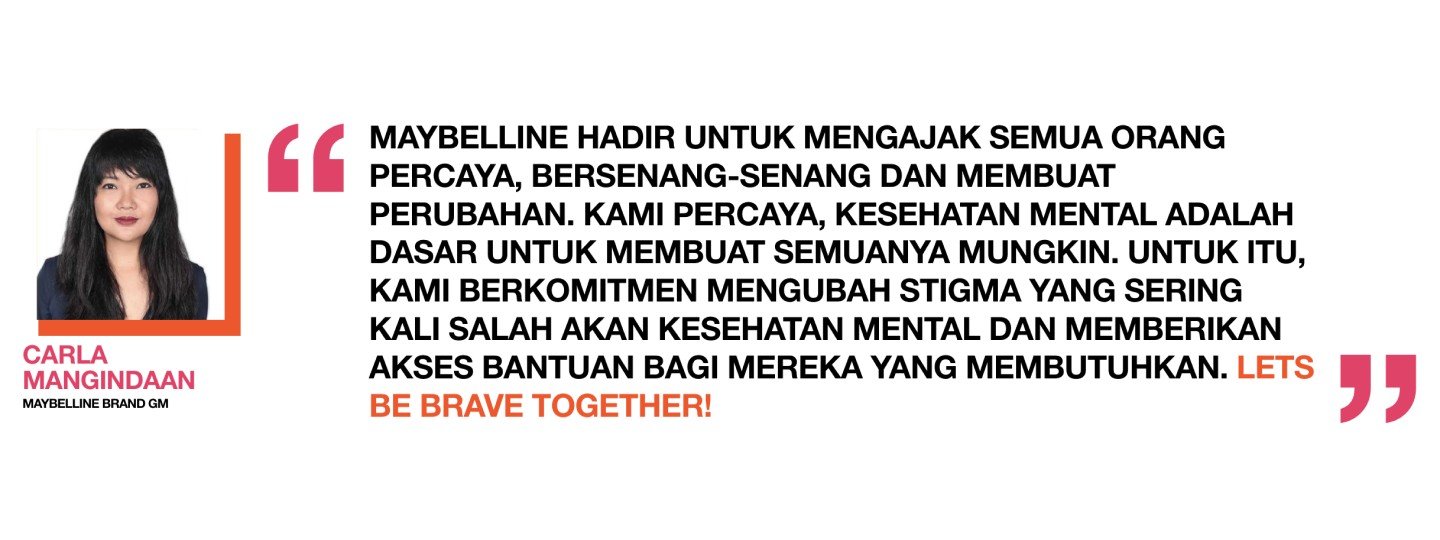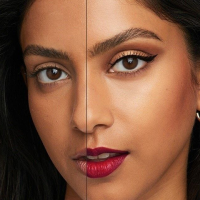Brave Together
Komitmen global untuk memberantas setiap orang yang menghadapi isu anxiety dan depresi. Bekerjasama dengan psikolog professional, Maybelline membantu menyiapkan support system untuk mengidentifikasi tanda-tanda, mengaplikasikan self-care, dan mengakses bantuan professional secara gratis.

MISI

KOMITMEN

SUMBER DAYA
DAMPAK DARI CAMPAIGN BRAVE TOGETHER
45+
1.65 Juta
34
BE BRAVE. HAVE THE TALK. HELP A FRIEND.
Mulai SekarangTONTON SEKARANG: DAMPAK LOKAL KAMI DI SELURUH DUNIA
Saksikan dampak program Brave Together dari Maybelline di seluruh dunia dalam serial mini-dokumenter baru yang dipersembahkan oleh World Health Organization Foundation
Learn MoreDampak Lokal Brave Together
1 dari 4 orang saat ini mengalami kecemasan atau depresi. Kami percaya bahwa tidak ada seorang pun yang harus berjuang sendirian. Serial mini-dokumenter ini menyoroti dampak Brave Together dalam mendemokratisasi dukungan kesehatan mental bagi semua orang dengan fokus pada upaya lokal yang dilakukan di Jepang, India, dan Amerika Serikat.
• Nama sava Trisha Avyagari, presiden global brand Maybelline New York. Maybelline memiliki misi untuk memberikan kepercayaan diri kepada setiap orang untuk mengekspresikan kecantikannya. Kami tahu bahwa makeup bisa menjadi bagian dari hal tersebut, namun pekeriaan sebenarnva perlu dimulai dari dalam.
• Satu dari empat orang menderita kecemasan dan depresi, dan masalah ini bahkan lebih parah lagi teriadi di kalangan anak muda. Oleh karena itu kami memulai Brave Together untuk mendukung mereka yang menghadapi kecemasan atau depresi. Kami bermitra dengan lebih dari 45 NGOs di seluruh dunia untuk memberikan dukungan konseling gratis, dan kami memastikan bahwa dukungan tersebut disesuaikan dengan konteks budava lokal. Semua negara dan NGOs telah benar-benar mendukung misi ini, namun perialanan kita mash paniang.
• Kami berkomitmen untuk membuat dukungan gratis yang dapat diakses oleh semua orang sehingga tidak ada yang harus berjuang sendiran
BERI PERHATIAN PENUH
Percayalah pada insting kamu jika merasa ada sesuatu yang berbeda. Ketahuilah apa yang perlu diperhatikan
Tidak sama seperti Kesehatan fisik, tantangan pada Kesehatan mental seringkali memunculkan sisi kerentanan dan rasa sensitif, sehingga wajar bagi seseorang untuk tidak merasa siap berbagi kepada orang lain.
Semua orang pastinya memiliki hari buruk, bahkan bisa berturut-turut. Tetapi, Ketika gangguan itu terus terjadi, penting untuk kita memberikan perhatian—biasanya terjadi perubahan penampilan, mood, cara berbicara, perilaku, hubungan dengan orang lain, performa akademik, minat pada hobi dan hal-hal yang disukai, pola tidur, sampai Kesehatan dan kebersihan fisik.
RUANG DAN WAKTUNYA HARUS TEPAT
Cari waktu dan tempat yang tepat untuk memulai percakapan.
Meskipun beberapa orang mungkin merasa bahwa memulai percakapan dengan teman di tengah-tengah kehidupan sehari-hari, seperti di kantin atau di gym, sangat membantu - perhatikan bahwa apa yang teman kamu bagikan dapat didengar di tempat umum. Melakukan percakapan pribadi adalah pilihan yang paling aman.
Pastikan dalam keadaan sadar secara penuh
mendapat istirahat yang cukupdalam situasi tenang, dan tetap waspada
Bersiap untuk mendengarkan secara penuh
Mengatur Ponsel dalam mode silent dan simpan sejenak
Hormati privasi teman kamu.
Jangan membuat janji yang tidak bisa dijaga (yang berkaitan dengan keselamatan serta kerahasian)
AJUKAN PERTANYAAN
Sampaikan apa yang kamu amati dan tanyakan tentang hal tersebut.
Tips pertama adalah jadi seseorang yang penuh perhatian dan menjelaskan secara spesifik mungkin tentang tanda-tanda yang kamu amati. Temanmu akan sulit mengabaikan pertanyaanmu dengan jawaban “Aku baik-baik saja” jika kamu meminta mereka untuk menyadari perubahan atau perilaku yang kamu tunjukkan.
Cara terbaik menunjukkan perhatian adalah dengan sekadar mendengarkan katakata dan perasaan, bukan dengan langsung memikirkan bagaimana kamu bisa memperbaikinya. Merasa didengarkan bisa berdampak besar dan menyembuhkan.
VALIDASI PERASAAN TEMANMU
Dengarkan baik-baik dan tunjukan dukungan.
Memvalidasi perasaan tidak perlu dengan cara yang sulit, bahkan tidak harus menunjukkan kata-kata. Anggukan kepala dan kontak mata Ketika seseorang sedang membagikan perasaannya juga merupakan bentuk validasi.
Terkadang, semua hal sudah dilakukan dengan benar tapi kita masih mendapatkan penolakan. Tidak apa-apa Ketika itu terjadi, dan jangan paksakan seseorang yang belum siap untuk membagikan perasaannya. Lebih penting untuk terus membuka jalur komunikasi, tetap terhubung satu sama lain, dan selalu menanyakan kabar mereka secara berkala.
EKSPLOR BANTUAN PROFESIONAL
Ketahuilah dan bagikan pilihan bantuan yang kamu miliki.
Olahraga, meditasi, kegiatan sukarela, dan lain-lain – semuanya adalah bentuk perawatan diri (self-care). Dukunglah mereka untuk hal-hal tersebut, bahkan tawarkan jika mungkin mereka butuh dukungan dalam kegiatan mereka.
Bukan tanggung jawab kamu untuk menjadi ahli atau klinisi. Cari tahu dan bersiaplah untuk membagikan informasi terkait bantuan yang tersedia di sekolah atau komunitasmu di mana teman kamu dapat memperoleh bantuan secara professional. Lalu, dukung mereka secara positif untuk menyimpan nomor layanan pesan krisis di ponsel mereka.

BUTUH CERITA? DOWNLOAD APLIKASI KALM DAN MASUKKAN KODE BRAVE TO-GE-TH-ER
Jika kamu merasa cemas atau depresi, download aplikasi KALM lalu masukkan kode BRAVE TO-GE-TH-ER dan kamu dapat mengakses layanan dari konselor profesional secara GRATIS, TANPA SYARAT, dan RAHASIA.
MITRA LOKAL KAMI
KALM adalah sebuah platform kesehatan mental yang menyediakan layanan online dan offline counseling dengan psikolog dan konselor. Kamu bisa mengakses layanan konseling online dengan sistem real-time maupun on-going chat lewat aplikasi KALM yang bisa didownload di appstore dan playstore.
MITRA GLOBAL KAMI
AJUKAN PERTANYAAN
Bagikan apa yang kamu perhatikan dan tanyakan tentang hal tersebut.
Crisis Text Line menawarkan dukungan rahasia 24/7 gratis untuk semua jenis krisis kesehatan mental. Untuk warga Amerika yang mengalami kecemasan atau depresi, kirimkan SMS ke 741741 untuk dihubungkan dengan Konselor Krisis terlatih.
NAMI, Aliansi Nasional untuk Penyakit Mental, didedikasikan untuk membangun kehidupan yang lebih baik bagi individu dan keluarga Amerika yang terkena dampak penyakit mental melalui advokasi, kesadaran, dan pendidikan.
NAMI, the National Alliance on Mental Illness, is dedicated to building better lives for American individuals and families affected by mental illness through advocacy, awareness, and education.
.jpg?rev=-1&cx=0&cy=0&cw=800&ch=800&hash=7959259CA1F6B49CAD45D26E76CB8DED)
ELYSE FOX
1. SIMPULKAN SAD GIRLS CLUB DALAM SATU KALIMAT!
Kami adalah komunitas kesehatan mental yang memprioritaskan pembicaraan yang nyata daripada basa-basi dalam hal kesehatan mental.
2. APA BENTUK PERAWATAN DIRI YANG KAMU LAKUKAN?
Sebagai seorang ibu muda, wirausahawan, dan seorang Capricorn, aku selalu berada dalam mode kerja. Istirahat adalah cara terbaik bagiku untuk mengatur ulang dan menghadapi apa yang akan datang.
3. ADAKAH APLIKASI YANG MEMBANTU KAMU TETAP FOKUS?
Aku telah membuat beberapa daftar putar Spotify untuk melepaskan diri dari dunia dan menikmati suasana.
.jpg?rev=-1&cx=0&cy=0&cw=800&ch=800&hash=0B43D864AEFBAEFADE7770FA4E401793)
LARISSA MAY
SIMPULKAN #HALFTHESTORY DI SATU KALIMAT!
#HalfTheStory adalah perusahaan non profit yang bertujuan untuk membantu anak muda mengembangkan hubungan yang sehat dengan teknologi.
APA YANG MENJADI CARA SELF-CARE FAVORITMU?
Menari. Tidak ada cara yang lebih baik untuk melakukannya. Seperti kembali ke masa muda.
APAKAH ADA APP YANG MEMBUATMU TETAP RENDAH HATI?
Jour. Ini adalah aplikasi penjurnalan dengan petunjuk yang jelas untuk setiap suasana hati, hambatan, dan niat.
.jpg?rev=-1&cx=0&cy=0&cw=800&ch=800&hash=29AF2C60D887F6D0BB68CE9C92A22078)
STORM REID
1.APA HUBUNGAN KAMU DENGAN KESEHATAN MENTAL?
Aku merasa terhormat bisa menjadi bagian dari sebuah acara dan brand yang sangat peduli dengan kesehatan mental. Kesehatan mental dapat terlihat berbeda untuk setiap orang, jadi aku mencoba yang terbaik untuk memberikan pelayanan terbaik saat merawat, membicarakan, dan mengenali kesehatan mental pada orang lain sambil juga merawat diriku sendiri.
2. APA BENTUK PERAWATAN DIRI YANG KAMU LAKUKAN?
Mendengarkan musik adalah bagian besar dari rutinitas perawatan diri. Aku tidak peduli di mana ku berada di dunia atau bagaimana perasaan ku hari itt; menyalakan musik membuat semua merasa lebih baik.
3. APA ARTI MENGANGKAT TANGAN BAGI KAMU?
Meskipun ini adalah topik yang menantang untuk dibicarakan, ini penting, dan ini memberikan kesempatan kepada orang-orang untuk terlibat dalam percakapan tentang kesehatan mental agar mereka tidak merasa sendirian
Kecemasan & depresi terlihat berbeda pada setiap orang, sehingga sulit untuk didiagnosis. Setiap kondisi memiliki serangkaian gejala uniknya sendiri, yang dapat tumpang tindih. Berikut adalah 10 tanda umum untuk membantu mengidentifikasi apakah kamu atau seseorang yang kamu sayangi mungkin mengalami kecemasan atau depresi.
1. Merasa sangat sedih atau menyendiri selama lebih dari dua minggu
2. Mencoba menyakiti atau mengakhiri hidup seseorang & atau membuat rencana untuk melakukannya
3. Perilaku agresif, di luar kendali, dan berisiko yang menyebabkan bahaya bagi diri sendiri atau orang lain
4. Tiba-tiba merasa takut yang luar biasa tanpa alasan, terkadang disertai dengan jantung yang berdebar-debar, ketidaknyamanan fisik, atau kesulitan bernapas
5. Penurunan atau kenaikan berat badan yang signifikan
6. Melihat, mendengar, atau mempercayai hal-hal yang tidak nyata
7. Penggunaan alkohol atau obat-obatan yang berlebihan
8. Perubahan drastis dalam suasana hati, perilaku, kepribadian, atau kebiasaan tidur
9. Kesulitan berkonsentrasi atau tetap diam Kekhawatiran atau ketakutan yang intens yang menghalangi aktivitas sehari-hari






